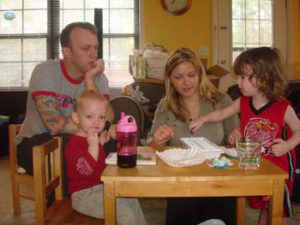Divorce is very difficult for children, who have trouble with change and loss. Telling them about your divorce is a big deal, and a lot of thought should go into how and when that happens. How you tell them will affect how they cope long term. Here are some important considerations before you and your partner share the news your marriage is over:
- Give a lot of thought to where and when you will break the news. According to a study discussed in Psychology Today [1] magazine, the memory of being told the news of divorce often stays with the child for the rest of his or her life. Many children don’t forget that day or the pain that goes with it.
-
- Choose a place your children feel safe and comfortable so the location does not add to the trauma.
- Tell all the children at once, so that older children do not carry the burden of keeping secrets from younger ones.
- Don’t tell them right before school or bed. They will need to have time to talk to you and be reassured.
- Finally, don’t tell them you are thinking of getting a divorce. Only share the news when it’s certain to avoid confusion or false hope.
 [2]
[2]
2. Become a mature, united front and tell the children together. The divorce may not be a joint decision, but as adults, you must set aside the bitterness and anger. This moment is about your children and how their lives will now change. Seeing their parents work as a team will help. Calling out your spouse in front of the children causes more problems for them. Children know they are one-half of each of you. If daddy is a “cheater” or mommy is a “liar,” they may begin to think of themselves negatively. Remember that your soon-to-be-ex may have treated you badly, but he or she will always be your child’s parent.
3. Plan what else you will say and do. Work together to plan a script. Be sure both parents say something when announcing the news. Include important points such as:
- How much you love the children and how nothing will change that love
- How this is not their fault
- How you will always be their parents, even if you are no longer husband and wife
- How you will always be a family
- Avoid blame, and skip any specific reasons such as cheating (see Point #2).
- Again, how much you both love them. Hugs are a good idea.
4. Be prepared for diverse and adverse reactions. If your marriage has been openly hostile, some children may feel relief or even happiness. But even in those cases, the child may recognize that he/she won’t see one of you as much anymore. It’s only human to cling to hope and in this case, most children will hope that his/her parents will fix everything and life will be good again. Announcing divorce means dashing that dream. Some children will yell, scream, or cry — or all three. Some children may react fine at first, but later start acting out at school. Others become more clingy.
5. Be prepared to answer questions — and be honest. Trying to spare their feelings by sparing information won’t work. Most of the questions will be about the child’s life. In an article in “Parents Magazine,” one woman expected tons of questions about the divorce. Instead her 8-year-old daughter asked, “Am I still having a birthday party?” Children will want to know whether they will be changing schools or moving, so if you already have visitation worked out, go ahead and share what you know. Additional questions will come later, after the children process the idea more.
Overall, it’s best to remember that your children have not had nearly as many life experiences as you, and this is a big life change.